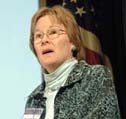 |
   |
|
December 12, 2008
Retreat Refreshes Behavioral, Social Sciences
 Dr. Christine Bachrach
Dr. Christine Bachrach
Dr. Christine Bachrach, acting director of the Office of Behavioral and Social Sciences Research, wanted just one thing out of the first-ever day-long retreat for NIH’s widely dispersed community of behavioral and social scientists, held Nov. 12 at Natcher Bldg.
December 12, 2008
CBT4CBT
New Hope for Treatment of Addiction
 Dr. Kathleen Carroll
Dr. Kathleen Carroll
Drug addiction is notoriously tough to treat, but now research is showing a fresh way to tackle the problem. It’s called computer-based training for cognitive-behavioral therapy (CBT4CBT)
OBSSR’s Mabry Wins with Systems Analysis Team
 OBSSR’s Mabry Wins with Systems Analysis Team
OBSSR’s Mabry Wins with Systems Analysis Team
More News >>
|
  |
|
January 28-29, 2009 Dissemination and Implementation Conference
February 9, 2009, 10:00 – 11:00 AM
Stigma: Lessons & New Directions from a Decade of Research on Mental Illness
July 12-24, 2009
OBSSR/NIH Summer Training Institute on Randomized Clinical Trials Involving Behavioral Interventions
May 3-8, 2009
Institute on Systems Science and Health
May 22-25, 2009
Gene-Environment Interplay in Stress and Health at the Association for Psychological Science 21st Annual Convention, San Francisco, CA
More Events >>
|
|
|
 |
 |
 |
 |
|
Home > Training and Career Development > Annual RCT Course
|
2003 Summer Institute on Design and Conduct of
Randomized Clinical Trials |
Training Symposium Series Issues in Randomized Clinical Trials havioral Interventions
|
Content
With the assistance of experts from several NIH ICs, the Office of Behavioral and Social Sciences Research (OBSSR) has organized a series of
symposia to provide NIH staff with expertise relevant to randomized clinical trials (RCTs) with behavioral interventions. The series assumes the
audience has basic or general understanding of RCT design and implementation. The emphasis is on issues of particular concern to RCTs in which the
intervention (i.e., treatment) is behavioral, whether alone or in combination with biomedical treatments. (The outcomes may be behavioral or
biomedical.) These issues may or may not be unique to behavioral RCTs (i.e., quantitative vs. qualitative differences in the nature of behavioral vs.
biomedical RCTs).
The series of symposia is based on OBSSR's Summer Training Institutes on Randomized Clinical Trials Involving Behavioral Interventions. The two-week summer training
institutes provide a concentrate and interactive learning environment. Enrollment has been limited to 30 fellows, with rs of research experience. OBSSR
is offering the symposia series in order to provide similar training to NIH staff in a convenient format and venue.
The course will be offered monthly in two-hour sessions at the Natcher Conference Center, NIH, beginning in January 2003. About 30 minutes of each symposium will be available for questions and discussion.
Extensive use of examples of successful (and not so successful) behavioral RCTs will be a hallmark of the series of symposia.
Recommended textbook:
Lawrence M. Friedman, Curt D. Furberg, and David L. DeMets, Fundamentals of Clincial Trials, Third Edition. New York: Springer-Verlag, 1998.
A few copies of the textbook are available at the NIH FAES Bookstore in the Clinical Center (Bldg. 10, Room B1-L-101 , 301-496-5272).
Intended Audience
The intended audience is NIH extramural and intramural employees, with required
advance registration to attend physically each symposium. (See below for VideoCasting attendance.) Extramural staff is responsible for preparing
announcements for research programs (e.g., Requests for Proposals/Applications) and for administering grants involving RCTs. In addition to involvement
in these kinds of activities, Intramural staff is engaged in RCTs as researchers. We anticipate that the audience will be mainly composed of individuals
with doctoral or medical/nursing research degrees. (Intramural Fellows are not eligible. They may wish to consider applying for the Summer Training Institute.)
All symposia will be available to NIH and public audiences via VideoCasting.
For schedule and viewing instructions, see http://videocast.nih.gov/. The NIH Office of Extramural Programs/
Office of
Extramural Affairs/Office of the Director is providing the necessary financial support to make videocasting available. The VideoCasts will be
closed-captioned for the hearing impaired.
Sign-language interpretation for the hearing-impaired will be provided. Individuals requiring reasonable
accommodations for disabilities in order to participate should note their needs on the registration form.
Learning Goals
The overall goals of the series of symposia are to provide sufficient information so that participants will be able to:
- Describe the principles underlying the conduct of unbiased clinical trials.
- Contrast biomedical vs. behavioral interventions in the context of RCT
- Evaluate and interpret critically the literature on RCTs for behavioral interventions.
- Contrast and evaluate alternative research designs in terms of their appropriateness.
- Contrast and evaluate methods for monitoring, coordinating, and conducting RCTs.
- Select appropriate outcome measures, enrollment strategies, and randomization techniques.
Registration Procedures
Advanced registration is required to attend in person each symposium. Enrollment will be on a first-come, first-serve basis. Please enroll only for the
symposia for which you are certain you can attend. We will let you know whether you are enrolled or are on the waiting list. If you enroll and later
learn that you cannot attend, please inform us so that we can offer your space to a colleague on the waiting list.
Registration is not required to view the VideoCasting of the symposia.
Please complete and return a registration form. The form is available in Adobe PDF. While it can be filled in our your computer, it does not
automatically submit your information. You must save the form to your computer for printing and faxing or for e-mailing as an attachment. You must fax
or e-mail it to:
Mr. Iain Mackenzie
Conference Manager
The Hill Group, Inc.
Fax: 301-897-9587
E-mail: imackenzie@thehillgroup.com
Curriculum, Schedule, and Location
A series of seven symposia are scheduled monthly, commencing January 10, 2003. Click here for details
for topics, dates, locations, and faculty. All symposia will be held at the Natcher Conference Center on the main NIH Campus.
Videocasting of the Symposia
We are live videocasting and archiving the entire series of symposia, thanks to generous support from the Office of Extramural Research, Office of the Director. See http://videocast.nih.gov/default.asp for information on how to view them over the Internet.
Videocasting is open to everyone, not just to NIH staff. You will need to know the date and time of each symposium in order to find the videocast link.
You can get this information at:
http://obssr.od.nih.gov/Conf_Wkshp/NIH-RCT/Content.htm.
Faculty Roster
The faculty consists of experienced researchers and science administrators from the outside of as well as inside of the NIH. Two faculty members will
provide instructions at each symposium.
Continuing Education Credit
The NIH/FAES is accredited by the Accreditation Council for Continuing Medical Education to sponsor continuing medical education for physicians.
The NIH/FAES designates this educational activity for a maximum of 12 credit hours in category 1 credit towards the AMA Physician's Recognition Award.
Each physician should claim only those hours of credit actually spent in the educational activity.
The National Institutes of Health (NIH) is approved by the American Psychological Association to offer continuing education for psychologists. The NIH
maintains responsibility for the program.
See the Course Binder for instructions, course evaluation form, and CE/CME application form. CE/CME
is available for attendance in person and via VideoCasting.
NIH Planning Committee
Questions about the Series
Please direct any questions or comments regarding the symposia to:
Ronald P. Abeles, PhD
Special Assistant to the Director
Office of Behavioral and Social Sciences Research
National Institutes of Health
Gateway Bldg., Rm. 2C234, MSC 9205
7201 Wisconsin Avenue
Bethesda, MD 20892-9205
Phone: 301-496-7859
E-mail: abeles@nih.gov
|
|
|
 |
 |
 |
 |
|
|
 |